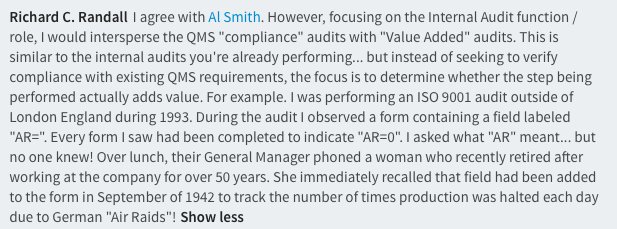Nos meus Workshops sobre a abordagem baseada no risco costumo usar uma sequência de imagens que culmina nesta:
Aquilo que era um desempenho positivo num ano passará a ser um desempenho negativo no ano seguinte se for repetido.
Por isso, faço as perguntas:
Se pesquisarmos a palavra risco na ISO 9001:2015 verificamos que aparece nas cláusulas:
- 4.4.1 - riscos nos processos (risco de não cumprir o que se espera de um processo)
- 5.1.1 - a gestão de topo deve promover a abordagem baseada no risco
- 5.1.2 - riscos associados à conformidade dos produtos e serviços e ao seu impacte na satisfação dos clientes (pode ser associado não só às especificações como à adequação do produto ao job-to-be-done do cliente. O mesmo produto que se adequa às necessidades dum cliente não serve para outro cliente com um outro desafio. Por isso, foco no cliente é, também foco nos clientes-alvo)
- 6.1 - título
- 6.1.1 - determinar riscos, tendo em conta o contexto e as partes interessadas, e prioridades para tratamento
- 6.1.2 - planear acções para lidar com os riscos e avaliar a sua eficácia
- 9.1.3 - avaliar eficácia das acções para lidar com os riscos
- 9.3.2 - avaliar eficácia das acções para lidar com os riscos
- 10.2.1 actualizar o levantamento dos riscos se necessário, quando acontece uma não-conformidade
Onde determinar riscos?
- nos processos - o que pode levar um processo a não atingir o seu propósito e nível de desempenho esperado?
- nos produtos e serviços - o que pode levar a falhas no cumprimento das especificações dos produtos e serviços?
- na satisfação dos clientes - o que pode levar a falhas no propósito de aumentar a satisfação dos clientes?
- nos objectivos do sistema de gestão - o que pode levar a falhas no cumprimento dos objectivos da organização?
Viajando no tempo até ao futuro para começar 2018 com os pés em 2019!
Que resultados quero estar a ver no meu sistema de gestão? Não os resultados do responsável do sistema de gestão, mas os resultados que interessam ao Mr. Burns da organização.
BTW, usava este exemplo em 2008 para explicar a minha interpretação para o uso das acções preventivas. Engraçado como as acções preventivas desapareceram do texto da norma porque foram integradas na abordagem baseada no risco.














